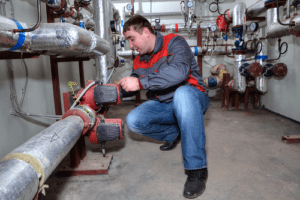How long should commercial heating systems last? Unfortunately, there’s no one correct answer to this question. Ideally, HVAC equipment will last 15 to 20 years. However, sometimes, commercial building owners make the mistake of replacing their equipment years before the 15-year mark. For one reason, they experience performance dips or breakdowns much sooner. For these reasons and more, one of the most commonly requested services at most HVAC businesses is the lifecycle analysis. Building owners want to know what kind of shape their HVAC systems are in and how soon they should be planning to replace them. This kind of service makes it a lot easier to budget and plan for unit replacement, rather than having to scramble on both fronts if a commercial heating installation gives up the ghost unexpectedly.
What Does a Lifecycle Analysis Look Like?
 When you hire an HVAC contractor to carry out a lifecycle analysis for your commercial heating systems, you are essentially asking them to carry out a full inspection of your system. The technician will look at the hardware in detail, ask a few questions about it (such as its age/initial installation date), and identify potential repairs or part replacements. Unless you’ve had a complete breakdown, your system can probably be repaired and maintained—at least to the point where you won’t need to replace it right now. However, the complexity and cost of those fixes and upkeep requirements may exceed what is worthwhile for the predicted usable life of the unit. If so, your HVAC technician will talk to you about replacing the system entirely.
When you hire an HVAC contractor to carry out a lifecycle analysis for your commercial heating systems, you are essentially asking them to carry out a full inspection of your system. The technician will look at the hardware in detail, ask a few questions about it (such as its age/initial installation date), and identify potential repairs or part replacements. Unless you’ve had a complete breakdown, your system can probably be repaired and maintained—at least to the point where you won’t need to replace it right now. However, the complexity and cost of those fixes and upkeep requirements may exceed what is worthwhile for the predicted usable life of the unit. If so, your HVAC technician will talk to you about replacing the system entirely.
Essentially, that weighing of cost and value is the core goal of any lifecycle analysis for HVAC equipment. You are trusting your technician to give you a professional opinion on whether it would be a wiser investment to replace your heating system or to continue maintaining it for a few more years. Numerous variables can impact the overall lifespan of your system, and your HVAC contractor will consider each of these variables before issuing a recommendation. Variables include:
- The age and design of the system: Even beyond the wear and tear of parts, the age of your system will impact its lifespan. Older systems lack much of the sophisticated technology and more durable components that are standard on HVAC equipment today. Even if your system can continue running in a workable fashion for another year or two, you might save money in the long run by upgrading to a more efficient, state-of-the-art system now. Your technician will take these factors into account when assessing system lifespan.
- The size of the system in relation to the size of your building: A heating system that has been properly sized to suit the square footage of your commercial building is going to last much longer than one that has always been either too big or too small. Mismatches between building size and system capacity require the system to work harder to maintain temperature, in turn, quickening wear and tear.

- The maintenance and upkeep the unit has received: A commercial heating system will last longer—often by several years—if it has received consistent annual attention, maintenance, and repairs throughout its lifespan. If you have been good about scheduling regular preventative maintenance, the outcome of your lifespan analysis is going to be more promising than if you’ve gone four or five years without having an HVAC contractor check the system. The importance of maintenance for system lifespan goes beyond the equipment itself, too. Indeed, consistent air duct cleaning is necessary to maximize HVAC airflow and eliminate any roadblocks that might place undue strain on your heating system.
- Other building factors: Dirty ducts and clogged vents aren’t the only building factors that can increase the load on your system. On the contrary, other elements—such as poor-quality insulation or drafty windows—can also make it more difficult for your system to do its job efficiently. These factors can easily impact system health and overall lifespan.
- Climate: The climate in the area where your commercial building is based will also impact the lifespan of the heating system. In colder areas with long winters, these systems are inherently doing more work for more of the year. In warmer or milder climates, the demands on heating systems are never as high. Buildings in these areas will typically be able to get a few extra years out of their systems, just because they aren’t being used as much.
Learn about the Lifecycle of Your Commercial Heating Systems Today
Knowing how much longer your HVAC equipment is projected to last makes it much easier to plan the smartest and most cost-effective strategy for keeping your building heated to a comfortable temperature. To learn more about the lifespans of commercial heating systems and all the factors that can play a role in those lifespans, contact your trusted HVAC contractor today.
